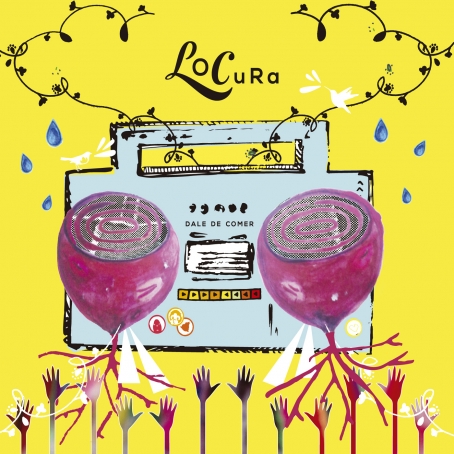Difficult to characterize and resistant of traditional genre definitions, San Francisco based chameleons, LoCura have steadily been creating their own sound. Built on the diversity of both musicians and styles, the band’s latest release Dale De Comer is no exception. Elements of son, cumbia, ska, rumba flamenca, afrobeat, and even reggaeton are distilled into the self-described “Califas Flamenkito”group’s third record. This provides for an infectious, multi-layered effort that is a testament to their continual evolution. Started in 2009 by lead singer Kata Miletich and guitarist Bob Sanders in Angel’s Camp, California, the band originally set out to play rumba flamenco-but exposure to San Francisco’s highly charged Latin music, culture, and arts scene opened up possibilities for much more. Bassist Izzy Sergio Duran, trumpeter Danny Cao, and drummer Carrie Jahde joined the group shortly after the duo moved there-a change that greatly intensified both live performances and the stylistic mixture of the band. Unlike their previous records, Dale De Comer is fairly short- the seven tracks total 28 minutes, roughly half the length of their previous efforts. Kata’s voice calls from a reverb-laden megaphone, introducing both “Amarantos” and the start of the colossal, revolutionary swing pervasive throughout the album. “No Ves” begins with a gentle Frusciante- inspired guitar riff, opening up as Miletich criticizes the politics and industrialization of consumerism. “Dos Lobos” conjures the image of an embattled soul struggling with anger and love-the latter part of the song musically evoking what had previously been laid out lyrically. “Dale De Comer” is perhaps the steepest brew of LoCura’s many influences-the reggaeton beat, mariachi horn section accents, and flamenco guitar solo give way to a Sufi-inspired chant in Spanish. Language barriers are broken throughout the lyrics too, as the well-seasoned Miletich switches between both Spanish and English- at times even using a few Italian words. Though less material than their previous works, this album is no less potent. The band reps their Bay Area roots and defines themselves by their constant stylistic ambiguity, keeping in mind that most of it is pure madness. – Justin Kohlberg
